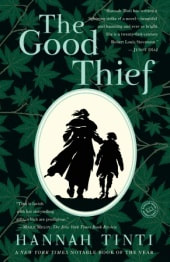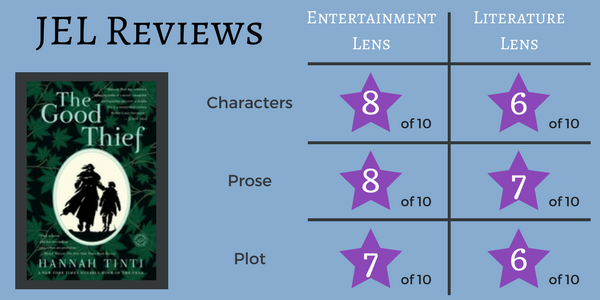Welcome to another installment of my #JELreviews series!
Be warned: I am a forgiving reviewer. When you come here, you will not find me eviscerating novels. I’ll point out what I liked and what I didn’t like, and I’ll anchor everything in my opinion, rather than some self-ordained concept of what is “good” or “bad.”
I also plan to break each review into two sections: one for those who haven’t read the book, and one for those who have read the book. I’ll rate (1) characters, (2) prose, and (3) plot through two lenses: entertainment and literature. (Basically, how I felt about it while I was reading, and how I felt about it after I'd thought about what I was reading.)
That being said, on to #JELreviews!
Be warned: I am a forgiving reviewer. When you come here, you will not find me eviscerating novels. I’ll point out what I liked and what I didn’t like, and I’ll anchor everything in my opinion, rather than some self-ordained concept of what is “good” or “bad.”
I also plan to break each review into two sections: one for those who haven’t read the book, and one for those who have read the book. I’ll rate (1) characters, (2) prose, and (3) plot through two lenses: entertainment and literature. (Basically, how I felt about it while I was reading, and how I felt about it after I'd thought about what I was reading.)
That being said, on to #JELreviews!
The Good Thief by Hannah Tinti
For those who haven't read the book:
| The Good Thief by Hannah Tinti charmed me from the first page until the last. The novel's chief strengths are its comedy, wit, and allure. Though you may see this categorized as historical fiction, I'd recommend approaching it as a fantasy novel set in post-colonial America. The setting and tone are reminiscent of Charles Dickens matched with Edgar Allan Poe and a healthy dash of fairy-tale heart. In Saint Anthony's orphanage in New England, we meet twelve-year-old Ren, a one-handed Catholic boy in a Protestant world. |
It had been decided that the brothers must give the children some knowledge; at the very least enough language to read the Bible, and enough arithmetic so that the Protestants could not cheat them.
The novel starts with Ren's unexpected and suspicious adoption by a fast-talking gallivant (can I use that as a noun? I feel I can use that as a noun.)—appropriately named Benjamin Nab.
What unfolds is a somewhat episodic accounting of Ren's journey through midnight graveyards, overworked medical hospitals, mousetrap manufacturing factories, and the occasional basement and cellar. (If you enjoyed The Graveyard Book by Neil Gaiman, you'll probably find similar appreciation for The Good Thief.)
You'll love the characters in this book. You'll love the sweetness and the sorrow. Ren, in particular, is a delight to follow.
What unfolds is a somewhat episodic accounting of Ren's journey through midnight graveyards, overworked medical hospitals, mousetrap manufacturing factories, and the occasional basement and cellar. (If you enjoyed The Graveyard Book by Neil Gaiman, you'll probably find similar appreciation for The Good Thief.)
You'll love the characters in this book. You'll love the sweetness and the sorrow. Ren, in particular, is a delight to follow.
[Ren] stole socks and shoelaces, combs and prayer cards, buttons, keys, and crucifixes. Whatever crossed his path. Sometimes he would keep the items, sometimes he would return them, sometimes he would toss them down the well. In this way Ren was responsible for most of the lost things being prayed for at the statue of Saint Anthony.
Though this book certainly was not written for children, I think I would have loved this book as a child. It's a cathartic and satisfying story with great dialogue, excellent comedy, and tangible warmth.
For those who have read the book:
Spoilers to follow!
Let's talk about Dolly.
Let's talk about how this book changed for me the moment Dolly sat up in that wagon, bagged and blind in his purple suit—a massive murderer plucked from his own grave.
Eerie. Absurd. Delightful.
Let's talk about Dolly.
Let's talk about how this book changed for me the moment Dolly sat up in that wagon, bagged and blind in his purple suit—a massive murderer plucked from his own grave.
Eerie. Absurd. Delightful.
"I've decided," said Dolly. "I'm not going to kill him."
"Who?"
"The man I was hired for."
Ren could feel his own breath against the blanket. Everything he'd ever done seemed to rest on this moment. "Why?"
"Because you asked me not to."
Dolly is the Hulk; he's Hodor meets the Hound; he's Frankenstein; he's every nightmare and dream combined in one. And I wish he played more of a role in the novel. I wish I'd seen him sleeping beneath Mrs. Sand's loaner bed more often.
Let's talk about Mrs. Sands. The warm, loud, brazen, determined, generous Mrs. Sands, who mended her little brother's socks and left him supper, whom I'd like to mimic more as I age.
You've read the book. And when I think about what I want to say to someone who's read this book, inevitably, I want to commiserate over the glee I felt reading these characters.
Yes, they're caricatures. None of the characters reaches particularly deep. And there's no question that the characters are exactly as Ren sees them. But the point of this book is its charm, not its startling revelations. This book is a journey—not a question, not an answer, but an experience.
The ending with Benjamin Nab did disappoint me. I'm not sure it made much sense for him to leave; neither his character nor the logistics of the situation quite justified it. However, the life ahead of Ren with Tom and Brom and Ichy and Mrs. Sands and the mousetrap girls would be tainted by Benjamin's presence, and I suspect that to be why Tinti sent Nab away.
Let's talk about Mrs. Sands. The warm, loud, brazen, determined, generous Mrs. Sands, who mended her little brother's socks and left him supper, whom I'd like to mimic more as I age.
You've read the book. And when I think about what I want to say to someone who's read this book, inevitably, I want to commiserate over the glee I felt reading these characters.
Yes, they're caricatures. None of the characters reaches particularly deep. And there's no question that the characters are exactly as Ren sees them. But the point of this book is its charm, not its startling revelations. This book is a journey—not a question, not an answer, but an experience.
The ending with Benjamin Nab did disappoint me. I'm not sure it made much sense for him to leave; neither his character nor the logistics of the situation quite justified it. However, the life ahead of Ren with Tom and Brom and Ichy and Mrs. Sands and the mousetrap girls would be tainted by Benjamin's presence, and I suspect that to be why Tinti sent Nab away.
Overall, The Good Thief excels in the emotions it inspires. Though I rarely re-read books, I can easily envision myself returning to Tinti's tale in times of need.



 RSS Feed
RSS Feed


